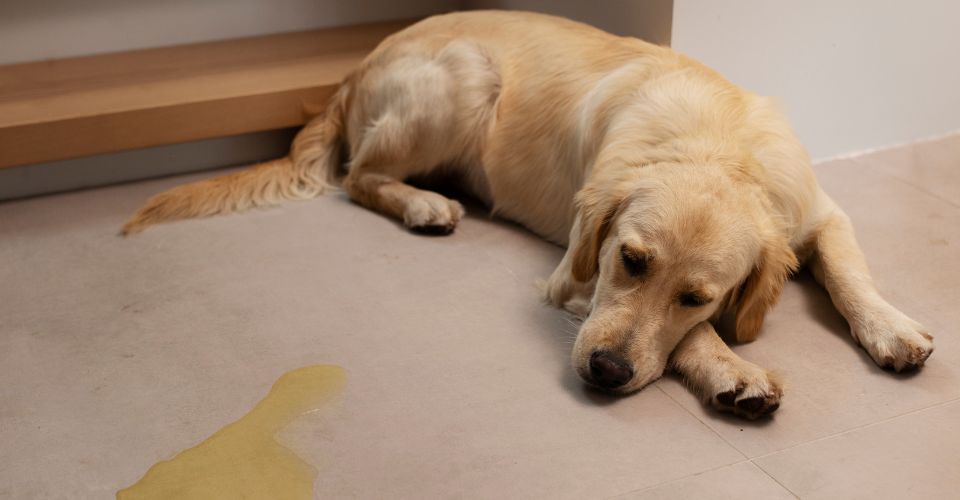Humans and dogs generally share the same body functions. For example, if you have an empty stomach or ate spicy Indian foods, you will hear your stomach gurgling constantly and might feel embarrassed by constant rumbles.
Likewise, a dog’s stomach also gurgles if he has an empty stomach or if he has eaten something he shouldn’t. Though dog stomach gurgling results from normal body functioning, if the stomach noises stay for long, there might be underlying serious health concerns.
Why Is My Dog Stomach Gurgling?
If your dog experience stomach gurgling, it may be due to one of the following reasons:
- Hunger
- Indigestion
- Diet Change
- Gas
- Stomach Toxicity
- Intestinal Parasites
- Gastrointestinal Foreign Bodies
- Glandular Disorders
- Dietary indiscretion
- Pancreatitis
Medically termed “Borborygmi,” stomach gurgling or stomach noises are common in dogs. These are the noises that are produced when the food moves from the stomach to the intestines.
According to Dr. Dave Nicol, BVMS Cert MGMT of Roundwood Vets, “it is one of those symptoms that can mean anything from trapped wind—totally harmless—to a twisted stomach (GDV)—totally deadly.” He further adds, “but usually it is a sign that something has upset the stomach and is leading to more gas being produced or the intestines moving food along more quickly to get it out as fast as possible.”
Nicole LaForest, LVT, RVT, CCFT, says, “the presence of stomach gurgling may occur from simply feeding table scraps, dietary changes, intestinal parasites, toxicity, immune-mediated conditions, such as hemorrhagic gastroenteritis, IBS, or Crohn’s, fluid in the abdominal cavity and potentially from ingestion of a foreign body, such as a rock, stick, or toy that may have potentially perforated through the intestines.”
Adding more, she says, “if your pet has recently had surgery or received anesthesia, stomach gurgling may be indicative of his intestines becoming mobile and responsive to the (lack thereof) drugs.”
Is Dog Stomach Gurgling Dangerous?
A gurgling stomach signifies different diseases. However, the cause can only be determined by the circumstances, longevity, and intensity of the noises.
There are four types of noises that may emanate from the stomach, namely:
- Gurgling
- Rumbling
- Growling
- High-Pitched
Here are some situations where you are more likely to hear your dog’s stomach gurgle.
- If it’s the morning, and your dog is having hunger pangs because he has not yet been fed, give him his breakfast. Everything is fine if the noises stop after he fills his tummy—it was merely the hunger.
- If your dog’s stomach is rumbling along with a combination of mild lethargy or loss of appetite, it can be the red flag for diarrhea or vomiting. In that situation, give him foods easily digestible, such as boiled boneless, lean meat with steamed white rice.
- If your dog‘s stomach is gurgling loudly and seems sick, tired, and lethargic, has low appetites, is drinking water excessively, and has diarrhea and vomiting, then seek veterinary care immediately. A major sign of a dog’s stomach upset is when he is not eating much and is vomiting.
In the next section, we will discuss the reasons behind stomach gurgling in detail.
What Causes the Gurgling in Your Dog’s Stomach?
Hunger
‘Empty pots make more noise.’
When your dog hasn’t eaten food, his stomach is full of gas and plenty of chemical reactions are taking place in there. The more empty the stomach, the louder the sound.
When the stomach is empty, it causes the secretion of hormones that initiates hunger contractions within the gastrointestinal (GI) tract. Per the research, hunger contractions and noise related to it continue for 10 to 20 minutes once initiated and repeat every one to two hours until the food is ingested.
With no food to muffle the sounds, the stomach gives out audible gurgles that feel like the sound can be heard from a mile away.
Indigestion
Not only do empty stomachs gurgle, but filled stomachs also roar as well.
If your dog has munched on something indigestible or gulped more food than he needs, the stomach has to work hard and release more digestive juices to mellow the food for easy digestion. This secretion of enzymes and acids produces sounds called stomach gurgles.
When a dog’s intestine processes food, his abdomen may rumble. But it’s nothing to worry about.
However, if indigestion stays for longer and your dog hasn’t pooped for a day or more, it can be a sign of serious stomach upset. In normal routines, the stomach solves its problem on its own, except if your dog hasn’t eaten something toxic.
If you suspect that the issue is serious, consult your vet.
Stomach Toxicity
If your dog has accidentally chowed down chocolate, coffee, alcohol, onions, garlic, cat food, fried snacks, grapes, processed foods, or any other food known for causing toxicity in the dog’s stomach, as a response, his stomach produces noises.
Diet Change
If you make a big change in your dog’s diet, even if it’s transitioning from good-quality to premium-quality food, the dog’s stomach takes time to adjust to the new ingredients. In response to that, gas, bloating, and stomach gurgling are the common side effects.
Gas
“Gas is a normal byproduct of digestion,” writes Tracey Jensen, DVM, Dipl. ABVP, co-chairman of Wellington Veterinary Hospital in Wellington, Colorado. “When you hear the stomach gurgling, it’s gas and liquid. It’s the same kind of sounds you hear in a soda can, it just sounds different because it’s inside a dog. Dogs burp just like people do, and they expel gas from the intestines in the form of flatulence.”
Stomach gas or flatulence is the outcome of indigestion, stomach toxicity, diet change, and hunger.
Other than the muscle contractions, digestive juice secretion, food movement in the digestive tract, and gas are other culprits that make your dog’s stomach gurgle.
Excessive flatulence is the result of swallowing more air while eating or drinking. Gas can also be released because of underlying digestive health problems such as recurring indigestion or irritable bowel syndrome (IBS).
Stomach Bloating or Gastric Dilatation-Volvulus (GDV)
Otherwise known as “the mother of all emergencies,” an untreated stomach can be fatal for dogs. In stomach bloating, the dog’s stomach will rotate or twist, trapping blood in the stomach and blocking it from returning to the heart and other organs, which can send your dog into shock. In addition, it hinders the blood flow to his stomach lining and can tear the wall.
Bloating is caused when a dog gulps down a mouthful of food and immediately goes out for vigorous physical activity.
Lactose Intolerance
Lactose-intolerant dogs are likely to have gassy stomachs quite often. Since most foods contain dairy products, this lactose intolerance can take a toll on their stomachs, giving them gas, diarrhea, vomiting, and intestinal gurgling.
Intestinal Parasites
Common intestinal parasites that can nurture in a dog’s stomach include roundworms, tapeworms, hookworms, coccidia, and giardia.
Dog’s stomachs can become hosts of these parasites after drinking stale, contaminated, or polluted water.
Not only do these parasites predispose dogs to stomach upsets, cramps, and pain, but they also cause scooting, diarrhea, weight loss, and stomach gurgling.
Gastrointestinal Foreign Bodies
Dogs like to chomp on everything they can get their paws on, which gets them into stomach issues.
Gastrointestinal Foreign Bodies occur when your pooch swallows indigestible and inedible objects. Not only do they hurt and wound his body internally, but they also cause stomach disorders, including hemorrhagic gastroenteritis, vomiting, gas, or gurgling.
Thyroid Disorders
The thyroid gland is a small, butterfly-shaped organ in the front of the neck, which regulates metabolism and helps the body use food energy.
Disorders with the thyroid gland cause hyperthyroidism or hypothyroidism that leads to stomach acid high-lows, difficulty swallowing, vomiting, diarrhea, chronic digestive trouble, and stomach gurgling.
Thus, if your dog is enduring thyroid malfunctioning, you’d hear the dog’s stomach gurgling a lot.
Pancreatitis
Pancreatitis is pathologic inflammation of the pancreas. The pancreas is a long, flat gland located behind the stomach that aids digestion and secretes hormones that regulate sugar breakdown (glucose). Should there be pancreatitis, dog stomach gurgling may be a common phenomenon.
How to Prevent Dog Stomach Gurgling?
Though a dog’s stomach gurgling is the result of a normal body function, if you want to prevent loud and pitchy gurgles, start by taking control of the dog’s food.
Start by meal portioning and adjusting timing as per the recommendation of The American Society for the Prevention of Cruelty to Animals® (ASPCA®), listed below.
| Age | Per Day Meal Requirement |
| 8 to 12 weeks | 4 meals |
| 3 to 6 months | 3 meals |
| 6 months to 1 year | 2 meals |
| >1 year | 1 meal |
| Others, depending on their health and size | 2 smaller meals |
Furthermore, the ASPCA advises to:
- Feed your dog with premium-quality dog food manufactured under the Association of American Feed Control Officials’ directions.
- Restrict the treat-calorie intake only to 10% of the daily calorie requirement.
- Limit giving them human food in large amounts as it can cause mineral and vitamin imbalances.
- Take care of hygiene.
Sticking to the guidelines will prevent not only stomach gurgling but also other issues not necessarily related to the stomach.
LaForest advises, “try to rule out toxicities within your households such as chocolate, raisins, rat bait, or sugar-free gum that may be the cause of your dog’s stomach gurgling.”
How to Treat Your Dog’s Gurgling Stomach?
If, along with stomach gurgling, your dog appears to be suffering from any of the following symptoms, have him checked out by the vet as soon as possible:
- Vomiting
- Constipation
- Diarrhea
- Loss of appetite
- Excessive thirst
- Dehydration
- Seizures
- Whimpering and panting
- Restlessness or other signs of pain
- Severe, persistent, or bloody diarrhea
- Unusual behavior
- Drooling
Talking about the treatment, we recommend taking veterinary care before administering at-home treatment or home-based remedies. Before taking your dog to the vet, consider withholding his food and water to let his stomach settle. If need be, feed him a bland diet of unseasoned boiled poultry or fish and white rice.
Lastly, as LaForest recommends, “If your pet is rapidly losing water, intravenous or subcutaneous fluid therapy along with an anti-nausea, antacid, anti-diarrhea or antibiotic may be necessary. If parasites are what is plaguing your pet, a dewormer or monthly preventative for worms and other parasites may be necessary.”
As mentioned at the outset, if the sounds are quieter and the dog seems to be comfortable, then your dog stomach gurgling is nothing to worry about. However, if the dog is disturbed and there is a change in his behavior, and the sounds are loud, consult your vet immediately.





